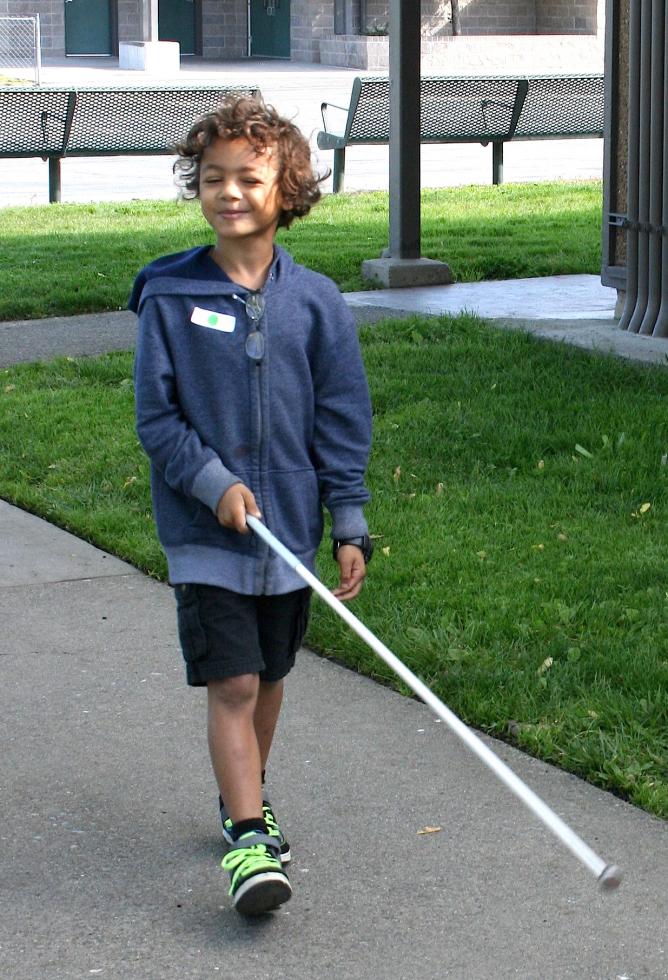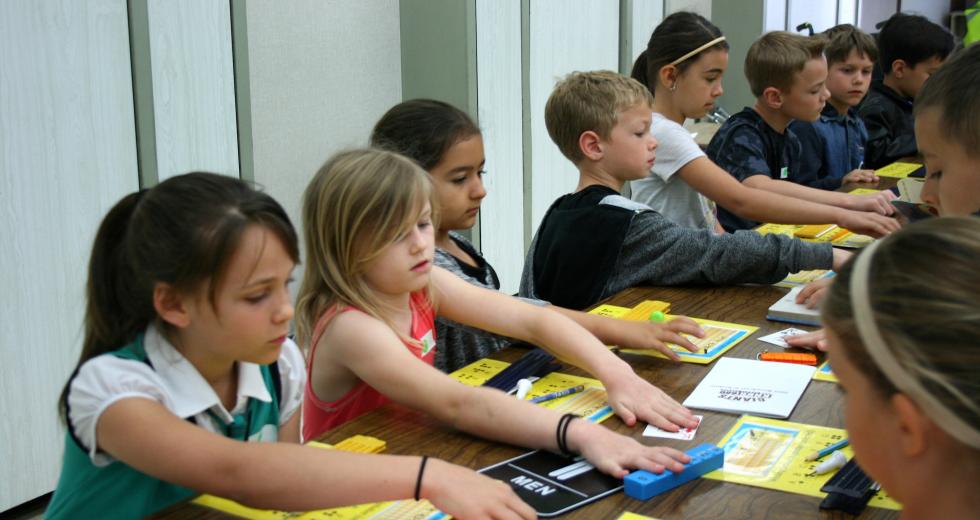On an August morning during the first week of school, 60 or so 4th grade students of H. Clarke Powers Elementary School in Loomis gather on the floor of the multipurpose room to experience A Touch of Understanding, a Granite Bay-based nonprofit organization that educates children and adults about disabilities to foster inclusive environments.
After listening to speakers discuss their disabilities — one man clicks through a slideshow detailing his journey using prosthetic arms following a racing accident; a 7th grade student shares her story of growing up with Down syndrome — students break into small groups and rotate in six stations representative of different disabilities. In one, students close their eyes, utilizing white mobility canes to navigate a patch of greenery in an effort to comprehend blindness. In another, they plant themselves in wheelchairs and practice going up slopes, turning and braking. Other stations include writing in braille, viewing and touching prostheses, and discussing learning disabilities and autism.
A boy learns to use a white mobility cane while walking with his
eyes closed during a workshop held by A Touch of Understanding.
(Photo courtesy Meghan Adamski)

This hands-on approach to understanding disabilities is at the center of A Touch of Understanding, which was inspired by founding director Leslie DeDora’s personal experience. “When my son was 3, we went to a [children’s] museum and there was a disability area there and I let my son sit in the wheelchair and handle the crutches,” DeDora explains. “He talked about it for months and months. If I had just walked past it and said, ‘Oh, that’s a wheelchair, people might use that if they can’t use their legs,’ he would not have remembered it. It was the fact that he had experienced it.”
ATOU is also one of 52 nonprofits to receive grant funding from the City of Roseville earlier this summer. The organization received $10,000 (grants ranged from $1,875 to $10,000). The competitive program requires only that the organization serve citizens of Roseville and demonstrate need. Funding for the grants comes from the City’s unique Citizens’ Benefit Fund, which was created in 1993 after the sale of city-owned Roseville Community Hospital. Profits from the sale went into a trust and each year a percentage of the interest earned is used to fund the grant program.
Related: Missing Pieces
“The city council that made this decision was very forward thinking,” says City of Roseville Public Information Officer Brian Jacobson. “Most city councils would have put that money into a one-time project — a building or a road — but they took that money and they gave it back to the community in a unique way.”
A 4th grade student experiences a wheelchair during a workshop
held by A Touch of Understanding. (Photo courtesy Meghan Adamski)

This year, the City doled out over $400,000, but Jacobson says this figure is less than ideal. In past years the fund, which fluctuates based on interest rates, has amounted to nearly $800,000. Yet these variations hardly dent the program’s impressive impact: Now in its 23rd year, the Citizens Benefit Fund has provided nearly $15 million in awards, far surpassing the proceeds generated from the hospital sale.
The program is also supplemented by the Roseville Employees and Annual Charitable Hearts fund, which, as the name indicates, consists of donations of present and former City employees.
“These nonprofits are helping the community in needed ways that the government and private and public sectors aren’t able to or are unwilling to do,” Jacobson says. For example, this year’s diverse recipients include homeless-relief organization The Gathering Inn, Seniors First, performing arts group Stand Out Talent, which is renovating their venue space at Tower Theatre in downtown Roseville, and Roseville Community Concert Band, which is raising money for music camp.
For A Touch of Understanding, additional funding helps support the cost schools pay to host the program, which makes up about a third of the organization’s budget, enabling ATOU to be on more campuses, and help more students develop understanding around disabilities. Last year, ATOU served 10,000 students in 101 schools in eight counties in Northern California, and the organization anticipates the same figure, if not more, this year. In addition to serving students, the group hosts sessions for businesses and government agencies and operates a volunteer network called Youth FORCE (Friends Offering Respect Creating Empowerment), which is expanding as clubs in area high schools.
“That grant allows us to make sure we can continue serving schools in Roseville,” DeDora says. “And Roseville has been participating for so long that we really feel the inclusive attitude within the city.”



